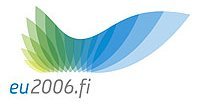“The sky is clearing. The storm clouds of last year are dissipating slowly and I think we have succeeded in giving the debate a push forward,” said Austrian Foreign Minister Ursula Plassnik when speaking about the period of reflection. Finland, however, does not seem to be so fond of the reflection period’s results and has directly criticized a prolonged “period of reflection”, decided on after the French and Dutch rejections, as an unsatisfactory measure. Still, on the concrete proposals side, most seem eager for EU heavyweight Germany to take over the presidency in 2007.
Finland intends to ratify the EU Constitution treaty as soon as possible. In a recent interview Finnish Prime Minister Matti Vanhanen stated “I recognise that the debate in other Member States is different. The message from Finland is that it is a good treaty”. He also commented that the Constitution would not be changed in any substantial way with re-negotiation anyway. Nonetheless, whether Finland will push for further ratification in other Member States as well is still uncertain.
On the further enlargement side, it is now becoming clear that Austria’s presidency has not been the spectacular boost for the integration of the Balkan region into the EU as many had hoped. In a decisive year for the region, with momentous changes in Serbia Montenegro, Kosovo and possibly Bosnia, the Finnish presidency is keen to further enhance the EU’s soft-power approach of generous funding and technical assistance to domestic reform processes. Romania and Bulgaria will most likely get a timed entry ticket during the presidency.
As far as Turkey and Croatia are concerned, Mr. Vanhanen promised “fruitful cooperation”, but also strictly pointed out the conditions that they must meet in order to pass the EU threshold. In Turkey’s case, the Cyprus question, over which Turkey and the EU have been deadlocked for the past two years, is planned to be tackled through a Finnish initiative.
Europe as a district of the global village has already been a priority of the Austrian Presidency, with quite a number of high profile meetings being held with out of continent countries, including Latin America and the USA. In this direction the ASEM Summit (Asia-Europe Meeting) will take place in Helsinki on 10 and 11 September 2006. The Summit will bring together the leaders of 38 Asian and European countries and the European Commission and is supposed to provide them with a forum for open, face-to-face discussions and genuine dialogue under the overarching theme of Global Challenges - Joint Responses.
Environmental friendly Finland has already vowed to promote the green agenda both in Europe and with the neighboring giant Russia. The main target is to show that protecting the environment doesn’t necessarily harm economic growth, and can even strengthen it; Finland itself is real case example of the policies now to be promoted on the European level. After all, the effects of global warming have already been making a visible appearance in mainland Europe.
The official priorities of the Finnish EU presidency will be presented to the country’s Grand Committee of the parliament this summer on June 21st days before the Austrian presidency presents its own results in a report that will be considerably shorter that anticipated. Even though Finland is not famous for its hot weather, it can brag about another hot experience, the Sauna. Let us hope that the Sauna’s steam will stimulate EU politics and the European integration process!

Follow the comments: |
|
